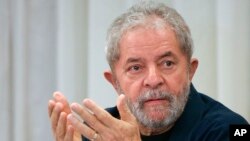Brazilian police on Friday were questioning former President Luiz Inacio Lula da Silva and searching his home and other buildings linked to him, one of the most dramatic developments yet in the sprawling corruption case at the oil giant Petrobras.
Silva's spokesman, Jose Crispiniano, confirmed that police were at addresses belonging to Silva, including his residence in Sao Bernardo do Campo in the greater Sao Paulo area and the Instituto Lula, his nonprofit organization. Crispiniano said Silva was speaking to investigators at the federal police station at Sao Paulo's Congonhas airport.
He said police were acting on a warrant that requires Silva to answer questions as part of the continuing probe into billions of dollars worth of alleged corruption involving Brazil's Petrobras oil giant.
Brazil's O Globo news network ran images of police officers around the building in Sao Bernardo do Campo, and the broadcaster said police were also at an address connected to one of his sons. Globo showed clashes breaking out between Silva's supporters and detractors outside the Sao Bernardo do Campo apartment.
Silva, a plainspoken former union leader, was among the most revered leaders in Brazilian history when he left office in 2010, leaving the post in the hands of his chosen successor, Dilma Rousseff.
Silva's Workers' Party reacted angrily, saying in a Twitter post, “we all must react now,” with a hashtag reading “LulaPoliticalPrisoner.”
The summons of Silva also brings the sprawling probe closer to Rousseff, though the once-close allies have visibly distanced themselves in recent months.
While Rousseff herself has not been accused of wrongdoing in the Petrobras probe, she is facing impeachment proceedings in Congress for her government's alleged use of the country's pension fund to shore up budget gaps. Rousseff denies the allegations.
In a statement on their website, the police said they are carrying out 44 judicial orders as part of the broader Petrobras probe, known as “Car Wash.”
The statement did not provide the names of those targeted, but it did specify that some of the orders were being enforced in the beachfront city of Guaruja, as well as the rural town of Atibaia.
Silva is suspected of having homes in both places, and investigators are probing reports they may have been remodeled by construction companies caught up in the Petrobras scandal, which has already ensnared top businessmen and heavyweight politicians from the governing Workers' Party as well as the opposition.
Last week, Silva and his wife, Marisa, were initially meant to appear before state investigators over the matter, but their lawyers said the two would not come and the appearance was cancelled.
On Thursday, the Supreme Court allowed corruption charges in the case to be brought against Eduardo Cunha, a top opposition figure and speaker of the lower house of Congress.
Prosecutors say more than $2 billion was paid in bribes by businessmen to obtain Petrobras contracts. Investigators also have said that some of the money made its way to several political parties, including the Workers' Party.
Silva last week denounced suggestions of personal corruption, accusing the media and opposition of spreading “lies, leaks and accusations of criminality.”
A lathe operator at a metal factory who entered politics as a labor union leader, Silva was widely seen as representing the common man, and his ascension to the country's highest office was hailed in a country where politics have long been dominated by the elite. During his two terms in office, from 2003-2010, Silva presided over years of galloping economic growth, which also saw the country's chronic inequality fall, with tens of millions of poor Brazilians entering the ranks of the middle class.
Despite a votes-for-bribes scandal during his presidency that took down his chief-of-staff, Silva left office with record high popularity levels. His hand-picked successor, Rousseff, handily won the presidency, and Silva was widely seen taking a guiding role in her governance.
Both of their popularity rates tumbled as Brazil slipped into its worst recession in decades and the Car Wash investigation spread, ensnaring key Workers' Party legislators. Rousseff has seen her approval ratings dip into the single-digits, though they've rebounded slightly of late.
Christianne Machiavelli, the spokeswoman of Judge Sergio Moro, who is spearheading the so-called Car Wash investigation into corruption at Petrobras, said that Silva is permitted to answer questions at any federal police station in the country and will not be taken to Curitiba, where Moro is based.
Brazil Police Question Ex-president in Corruption Probe

RIO DE JANEIRO —



